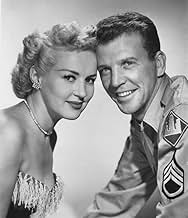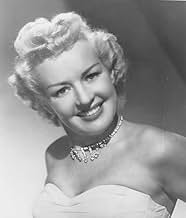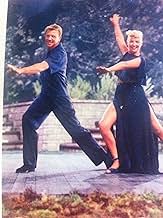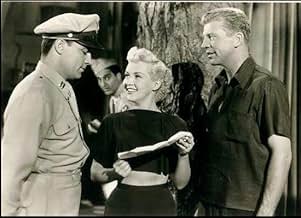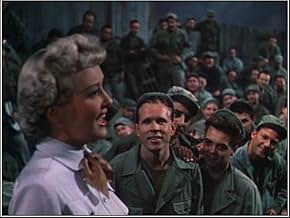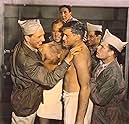VALUTAZIONE IMDb
5,7/10
302
LA TUA VALUTAZIONE
Aggiungi una trama nella tua linguaA G.I. in occupied Japan tries to re-woo his old love, who's putting on a show for the troops.A G.I. in occupied Japan tries to re-woo his old love, who's putting on a show for the troops.A G.I. in occupied Japan tries to re-woo his old love, who's putting on a show for the troops.
- Regia
- Sceneggiatura
- Star
- Premi
- 2 vittorie totali
The Three Dunhills
- Speciality Act
- (as The Dunhills)
Yumin Akita
- Japanese Man
- (non citato nei titoli originali)
Richard Allan
- Stewart
- (non citato nei titoli originali)
Leon Alton
- Soldier
- (non citato nei titoli originali)
Gordon Armitage
- Soldier
- (non citato nei titoli originali)
Robert Bohannon
- Soldier
- (non citato nei titoli originali)
Tommy Bond
- Little Soldier
- (non citato nei titoli originali)
Recensioni in evidenza
This was just about the last of the "putting on a show" musicals and even in 1951 it probably had rather an old fashioned look about it. It's nothing special, the music and sets are rather uninspired and the humor is dated but Betty Grable and Dan Dailey make a pleasant couple. Apparently they liked working together and it comes across in their dance numbers.
Highlights are Grable and Dailey's love duet and Bobby Short in the "Going Home Train" number.
Nice, nostalgic way to spend 90 minutes and the Grable legs have lost none of their lustre.
Highlights are Grable and Dailey's love duet and Bobby Short in the "Going Home Train" number.
Nice, nostalgic way to spend 90 minutes and the Grable legs have lost none of their lustre.
"Call Me Mister" is an interesting film on a number of counts. It's billed as a musical, in the form of a musical revue within a story. Betty Grable and Dan Dailey Star as Kay Hudson and Shep Dooley. He is a GI in occupied Japan sometime after the end of World War II, who tries to woo Kay. She is his old love from before the war who has arrived to organize entertainment shows for the soldiers.
The film is also interesting for something of the history that it shows. At the time it came out, the Korean War was being fought (June 25, 1950 - July 27, 1953). Grable's Hudson is in a uniform with a shoulder patch that reads "CAT." I had never heard of this before, but in checking it out I found that CAT stood for Civilian Actress Technician. The CATs were an entertainment program created during the Korean War for the U.S. Army. They would travel to Army posts outside the U.S., and organize, set up and direct entertainment using the GIs themselves.
The film has a screwy opening with dates. People are waiting in New York when at 7 p.m. on Aug. 14, 1945, Pres, Truman announces that Japan has surrendered. Then it switches immediately to Japan and American GIs marching at a replacement depot - the 4th Replacement Depot, Camp Zama, in Tokyo. While American occupation officially started with Japan's surrender, American units and servicemen began moving in and setting up house over the next few weeks. But, if the CATs weren't organized until the Korean War, then the setting of this film would be at least five years after the end of WW II.
The performance that the CATs organize is given in the Ernie Pyle theater. It was named after the famous and beloved WW II journalist who was killed near end of the war on a small island off Okinawa on April 18, 1945. Pyle won a Pulitzer Prize for his war reporting about individual GIs and their hometowns and families.
This is one of the few films in which the Dunhill Trio danced. Others in the cast include Dale Robertson, Richard Boone and Jeffrey Hunter. The film is okay but nothing special. The music and dance numbers take up just a small portion. The story itself and screenplay are just so-so.
Here are a couple of good lines.
Kay Hudson, "Well, captain, I'll be brief." Capt. Johnny Comstock, "Oh, please don't."
Stanley, played by Danny Thomas, "How do you like that. An American Greek copying Japanese numbers in English. Boy is this Army gonna be mixed up."
The film is also interesting for something of the history that it shows. At the time it came out, the Korean War was being fought (June 25, 1950 - July 27, 1953). Grable's Hudson is in a uniform with a shoulder patch that reads "CAT." I had never heard of this before, but in checking it out I found that CAT stood for Civilian Actress Technician. The CATs were an entertainment program created during the Korean War for the U.S. Army. They would travel to Army posts outside the U.S., and organize, set up and direct entertainment using the GIs themselves.
The film has a screwy opening with dates. People are waiting in New York when at 7 p.m. on Aug. 14, 1945, Pres, Truman announces that Japan has surrendered. Then it switches immediately to Japan and American GIs marching at a replacement depot - the 4th Replacement Depot, Camp Zama, in Tokyo. While American occupation officially started with Japan's surrender, American units and servicemen began moving in and setting up house over the next few weeks. But, if the CATs weren't organized until the Korean War, then the setting of this film would be at least five years after the end of WW II.
The performance that the CATs organize is given in the Ernie Pyle theater. It was named after the famous and beloved WW II journalist who was killed near end of the war on a small island off Okinawa on April 18, 1945. Pyle won a Pulitzer Prize for his war reporting about individual GIs and their hometowns and families.
This is one of the few films in which the Dunhill Trio danced. Others in the cast include Dale Robertson, Richard Boone and Jeffrey Hunter. The film is okay but nothing special. The music and dance numbers take up just a small portion. The story itself and screenplay are just so-so.
Here are a couple of good lines.
Kay Hudson, "Well, captain, I'll be brief." Capt. Johnny Comstock, "Oh, please don't."
Stanley, played by Danny Thomas, "How do you like that. An American Greek copying Japanese numbers in English. Boy is this Army gonna be mixed up."
I've recently seen several Dan Dailey movies and while they are rather pleasant viewing, they also suffer from a certain sameness...way too much sameness. In at least four of his films (a few of which ALSO feature him with Betty Grable), he plays a song and dance man who is a terrible husband and whose wife is sick and tired of it. And, in all of them, by the time the film ends, he hasn't changed that much and yet there's some happily ever after. It is complete formula...and because of that, there's really no need to see them all.
The story begins just after V-J Day. Shep (Dan Dailey) is looking for his wife, Kay, as they were separated by the war...with him serving in the Army and her as well, but with a unit entertaining the troops. But she does NOT want Shep to follow her as their marriage is in shambles and she is planning on divorcing him. Oddly, however, she has never finalized the divorce...which only encourages Shep to keep pursuing her...which he does throughout the film.
This is pretty much the usual Twentieth Century-Fox production. The songs are mostly forgettable (though I liked the one set on a train) and the formula is something every audience knows by heart. So, if you've never seen one, you'll probably like this movie a lot more than I did. I just felt it was a case of 'been there...done that'.
By the way, the film did a lousy job showing what was supposed to be Tokyo circa September, 1945. The town was mostly leveled...burned to the ground by American bombers. But here, it looks just fine. The story also is supposedly set in Kyoto...which was spared the bombings and the film get this part right.
For someone who has seen too many such Dailey films...4. For someone not tired of the formula...6.
The story begins just after V-J Day. Shep (Dan Dailey) is looking for his wife, Kay, as they were separated by the war...with him serving in the Army and her as well, but with a unit entertaining the troops. But she does NOT want Shep to follow her as their marriage is in shambles and she is planning on divorcing him. Oddly, however, she has never finalized the divorce...which only encourages Shep to keep pursuing her...which he does throughout the film.
This is pretty much the usual Twentieth Century-Fox production. The songs are mostly forgettable (though I liked the one set on a train) and the formula is something every audience knows by heart. So, if you've never seen one, you'll probably like this movie a lot more than I did. I just felt it was a case of 'been there...done that'.
By the way, the film did a lousy job showing what was supposed to be Tokyo circa September, 1945. The town was mostly leveled...burned to the ground by American bombers. But here, it looks just fine. The story also is supposedly set in Kyoto...which was spared the bombings and the film get this part right.
For someone who has seen too many such Dailey films...4. For someone not tired of the formula...6.
What a shame. They just never seemed to know what to do with Betty Grable. She gets these terrible films to star in, which she can't possibly save.
In this effort, we are at the very end of WW2 and it's the usual 'let's-put-on-a-show' type of musical storyline set against the backdrop of whether or not Betty Grable (Kay) will get back together romantically with fellow performer and soldier Dan Dailey (Shep). There are two other potential suitors on hand - captain Dale Robertson (Johnny) and pot-washer Danny Thomas (Stanley). We know that there is only ever going to be one winner so there is no drama with this storyline.
As for the cast, we get some terrible set pieces, especially the end performances. Also, how can we spend so much time with Thomas and his painful monologues? They are NOT FUNNY. Ever. How could the film's producers not catch on to this? The film scores points for Grable dancing, a couple of songs at the beginning, The Three Dunhills speciality dancing act and Technicolour.
There is nothing going on here whenever Grable is off screen. It's a tedious film that limps to an anti-climax of an ending.
In this effort, we are at the very end of WW2 and it's the usual 'let's-put-on-a-show' type of musical storyline set against the backdrop of whether or not Betty Grable (Kay) will get back together romantically with fellow performer and soldier Dan Dailey (Shep). There are two other potential suitors on hand - captain Dale Robertson (Johnny) and pot-washer Danny Thomas (Stanley). We know that there is only ever going to be one winner so there is no drama with this storyline.
As for the cast, we get some terrible set pieces, especially the end performances. Also, how can we spend so much time with Thomas and his painful monologues? They are NOT FUNNY. Ever. How could the film's producers not catch on to this? The film scores points for Grable dancing, a couple of songs at the beginning, The Three Dunhills speciality dancing act and Technicolour.
There is nothing going on here whenever Grable is off screen. It's a tedious film that limps to an anti-climax of an ending.
LLoyd Bacon, the director of "Call me Mister", had an excellent track record as the man that gave us "42 Street", "Gold Diggers of 1936", "The Frisco Kid", and "Brother Orchid", among others. The film is based in a musical review with music by Harold Rome and Arnold Auerbach.
The plot is a vehicle to show Betty Grable in a musical about a USO performer in post war Japan. The story is just a pretext to present Ms. Grable as an entertainer who wants to share joy among the troops still awaiting repatriation. Ms. Grable had such an effervescence about herself, it's easy to fall under her spell even in such a silly comedy as this one.
Dan Dailey plays the man in Ms. Grable's life. He was an excellent singer and dancer who always projected a masculine presence in anything he did. Both Ms. Grable and Mr. Dailey make a winning combination in the movie.
We get to see other faces that went to make names for themselves. Dale Robertson, Danny Thomas, Richard Boone, Jeffrey Hunter, Frank Fontaine, Jerry Paris and Bobby Short, among others.
The musical numbers were staged by Busby Berkley, a man who always had an edge in everything he did. The last production number stands out as the four principals, Ms. Grable, Mr. Dailey, Ms. Venata and Mr. Thomas take to the stage.
That was entertainment!
The plot is a vehicle to show Betty Grable in a musical about a USO performer in post war Japan. The story is just a pretext to present Ms. Grable as an entertainer who wants to share joy among the troops still awaiting repatriation. Ms. Grable had such an effervescence about herself, it's easy to fall under her spell even in such a silly comedy as this one.
Dan Dailey plays the man in Ms. Grable's life. He was an excellent singer and dancer who always projected a masculine presence in anything he did. Both Ms. Grable and Mr. Dailey make a winning combination in the movie.
We get to see other faces that went to make names for themselves. Dale Robertson, Danny Thomas, Richard Boone, Jeffrey Hunter, Frank Fontaine, Jerry Paris and Bobby Short, among others.
The musical numbers were staged by Busby Berkley, a man who always had an edge in everything he did. The last production number stands out as the four principals, Ms. Grable, Mr. Dailey, Ms. Venata and Mr. Thomas take to the stage.
That was entertainment!
Lo sapevi?
- QuizIn this musical, director Lloyd Bacon and dance director Busby Berkeley worked together for the first time since Quarantaduesima strada (1933).
- BlooperShep Dooley hops a ride on a rickshaw to reach his military base and passes a stonewall flower garden. Several hours and a very tired rickshaw runner later, he reaches his destination, and we pass the very same flower garden.
- Citazioni
Kay Hudson: Well, captain, I'll be brief.
Capt.Johnny Comstock: Oh, please don't.
I più visti
Accedi per valutare e creare un elenco di titoli salvati per ottenere consigli personalizzati
Dettagli
- Data di uscita
- Paese di origine
- Lingua
- Celebre anche come
- Call Me Mister
- Luoghi delle riprese
- Azienda produttrice
- Vedi altri crediti dell’azienda su IMDbPro
Botteghino
- Budget
- 1.900.000 USD (previsto)
- Tempo di esecuzione
- 1h 36min(96 min)
- Proporzioni
- 1.37 : 1
Contribuisci a questa pagina
Suggerisci una modifica o aggiungi i contenuti mancanti


